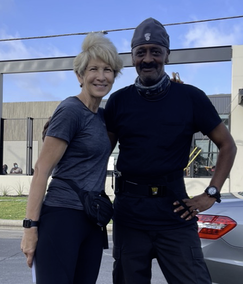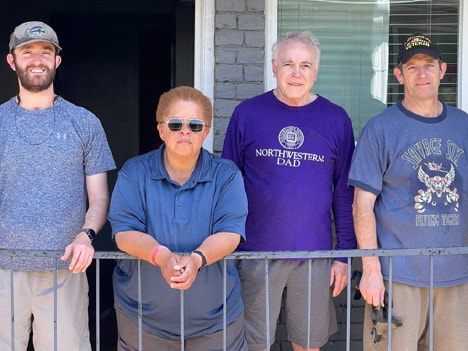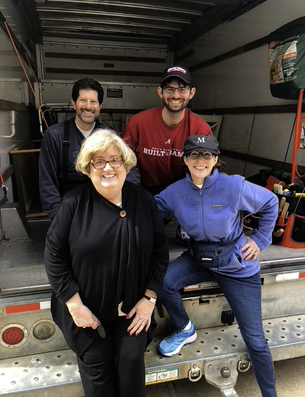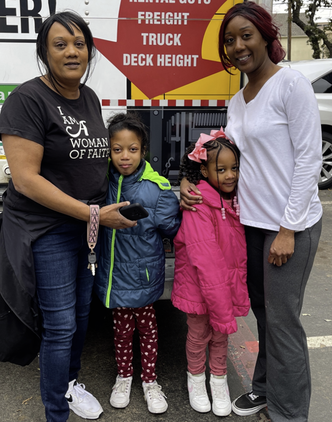The highest level of the ladder of charity is to provide an individual with the means to support himself, to become self-sufficient, so that never again will he or she need to rely on the generosity of others to maintain his independence.
Ladder Project client Wendy Raines on move-in day with (left to right) Matt Solka, Kevin Libby, Steven Solka
If 1,000 members of a synagogue can’t get one homeless person off the streets, staying by their side until they are financially and emotionally self-sufficient, how can we ever solve the problem of homelessness in America?
In 2018, Congregation Shearith Israel asked itself that question and decided to try a novel approach to a growing problem: take someone out of homelessness, permanently, by getting them whatever it takes – a job, transportation, a safe place to live, financial counseling – until they can make it on their own.
The approach had Jewish roots, Rabbi Adam Roffman told the congregant who brought him the idea, former Dallas Mayor Laura Miller: the Jewish philosopher Maimonides, 819 years ago, had created a ladder of charity, with the top rung of the ladder – the critical step – being a gift or loan that helped a person live independently. Hence the name that CSI’s rabbis subsequently came up with for the synagogue’s new program: The Ladder Project.
In short order, the program had an 8-person Executive Committee that would shepherd the work: Miller, Mindy Fagin, Jeff Hoppenstein, Larry Krasner, Marsha Lev, Andrea Solka, and Sally Wolfish z”l. (Although the membership has since changed slightly - adding Kevin Libby, Melanie Morris, Nonie Schwartz, and Harrian Stern - the work five years later is the same.)
Referrals have come to the committee from a number of organizations: homeless shelters, local hospitals, and word of mouth between the homeless themselves. Three criteria determine acceptance into the program: 1) the client must agree to work (we will help find a job if he or she is unemployed); 2) the client cannot lie to us (we invest too many resources to deal with dishonesty) and 3) the client cannot be a substance abuser, or have chronic mental illness (we are not professional caseworkers and cannot deal with these issues).
If we have learned one thing in five years it is this: if a homeless person is truly motivated to get out of his or her circumstances, it will happen with our help. And when it does happen, there is no better feeling for those who witness the result.
In 2018, Congregation Shearith Israel asked itself that question and decided to try a novel approach to a growing problem: take someone out of homelessness, permanently, by getting them whatever it takes – a job, transportation, a safe place to live, financial counseling – until they can make it on their own.
The approach had Jewish roots, Rabbi Adam Roffman told the congregant who brought him the idea, former Dallas Mayor Laura Miller: the Jewish philosopher Maimonides, 819 years ago, had created a ladder of charity, with the top rung of the ladder – the critical step – being a gift or loan that helped a person live independently. Hence the name that CSI’s rabbis subsequently came up with for the synagogue’s new program: The Ladder Project.
In short order, the program had an 8-person Executive Committee that would shepherd the work: Miller, Mindy Fagin, Jeff Hoppenstein, Larry Krasner, Marsha Lev, Andrea Solka, and Sally Wolfish z”l. (Although the membership has since changed slightly - adding Kevin Libby, Melanie Morris, Nonie Schwartz, and Harrian Stern - the work five years later is the same.)
Referrals have come to the committee from a number of organizations: homeless shelters, local hospitals, and word of mouth between the homeless themselves. Three criteria determine acceptance into the program: 1) the client must agree to work (we will help find a job if he or she is unemployed); 2) the client cannot lie to us (we invest too many resources to deal with dishonesty) and 3) the client cannot be a substance abuser, or have chronic mental illness (we are not professional caseworkers and cannot deal with these issues).
If we have learned one thing in five years it is this: if a homeless person is truly motivated to get out of his or her circumstances, it will happen with our help. And when it does happen, there is no better feeling for those who witness the result.
Meet Rodney Howard, 61, who works at Presbyterian Hospital at Dallas, where he was recently named one of the top producers in the call-in center that dispatches meals to patients. He was hired in 2022 by former Presbyterian CEO Jim Parobek, who asked The Ladder Project to help Rodney get out of the shelter and into housing. This video was taken by his Austin Street Center caseworker after we moved him into new his apartment.
Since our program’s inception, we have helped 30 men, women and children, in 15 separate families out of homelessness-- 23 of them continue to live on their own while we continue to be their advocates in times of adversity.
True, some people don't make it: our mission is to get the homeless jobs, housing, and financial advice, not control what they do once they have those things. But our commitment to them is total while they are in our program.
Money is only one driver of success: we have solicited cash donations only once, asking each congregant to donate $36 to the program at its 2018 kickoff. As hoped, we raised $36,000 that first year. Of course, your unsolicited donations are what has kept the program going, as has a recent $5,000 donation from the Mary Kay Ash Foundation, which was given unsolicited in recognition of our work.
In total, we have spent $64,230 on 39 clients (9 of whom we gave emergency assistance to but fell out of the program before we could house them), or $1,647 per person on average. As always, you can be certain that any dollars you give are spent solely on the clients.
Equally important to the success of our program are your continued donations of furniture, household items, clothing, job offers, financial counseling, and dental and medical services. And we always need your time - driving a client to the doctor or driver's license office, helping us on moving day, calling a debtor or non-responsive landlord as the client's advocate.
True, some people don't make it: our mission is to get the homeless jobs, housing, and financial advice, not control what they do once they have those things. But our commitment to them is total while they are in our program.
Money is only one driver of success: we have solicited cash donations only once, asking each congregant to donate $36 to the program at its 2018 kickoff. As hoped, we raised $36,000 that first year. Of course, your unsolicited donations are what has kept the program going, as has a recent $5,000 donation from the Mary Kay Ash Foundation, which was given unsolicited in recognition of our work.
In total, we have spent $64,230 on 39 clients (9 of whom we gave emergency assistance to but fell out of the program before we could house them), or $1,647 per person on average. As always, you can be certain that any dollars you give are spent solely on the clients.
Equally important to the success of our program are your continued donations of furniture, household items, clothing, job offers, financial counseling, and dental and medical services. And we always need your time - driving a client to the doctor or driver's license office, helping us on moving day, calling a debtor or non-responsive landlord as the client's advocate.
Another UHaul day: Jeff and Josh Hoppenstein, Marsha Lev (left), and Sally Wolfish, z”l

One example of the advocacy we do was highlighted in a Dallas Morning News article that ran on 7-23-23 about one of our most successful clients, a janitor at Presbyterian Hospital of Dallas, who after working overtime for a year to save his money, lost $9,500 to a scammer who hacked his online “bank” account. The LP had found Stanford an apartment, furnished it and moved him in a year before the thefts.The hack took 2/3 of his savings and devastated his plans to purchase dentures in preparation for a long-awaited visit to see his adult children this summer in upstate New York. He had not seen them for years due to his struggles in Dallas (which they were not aware of).
Laura Miller picks up Stanford Dixson at the Austin Street Shelter on moving day in 2022
As a result of the article, five Dallas citizens came forward and made Stanford whole by replenishing the $9,500 that he lost. The donors are Lisa Blue, Regen Horchow, Bruce and Carol Orr, and Mary Scanlon.
The Ladder Project is continuing to pursue Stanford’s “banking” app, called Chime, with the help of two pro bono lawyers who came forward to help after reading the article. (The Ladder Project team opened a real account for Stanford at Bank of America after the theft.) If the result of legal action is a $9,500 payment from Chime, the donors to Stanford Dixson can be reimbursed. The more ambitious goal is to expose the company’s predatory practices that target low-income people who do not believe they can get bank accounts at legitimate financial institutions. (Chime is a merely an app that contracts with real banks, acting only as a pass-through that is not FDIC-insured, offers virtually no customer service, and has thousands of complaints filed against it nationwide.)
One major boon to the LP in the past year has been the partnerships we have forged with two local hospitals -- Presbyterian Hospital of Dallas and the University of Texas Southwestern Medical Center (UTSWMC). Presbyterian’s former CEO Jim Parobek, who believed during his tenure that all large Dallas businesses should hire the homeless, agreed to interview and hire our eligible LP clients for hospital jobs and, in return, we helped the hospital’s homeless employees find housing. Parobek’s Human Resources team continues to partner with us. To date, we have placed three clients at Presby and helped four of their employees.
Dan Podolosky, President of UTSWMC and a longtime member of CSI, also opened the door for us at his hospital, introducing us to his hiring team, which has been extremely supportive of our program. Like Presbyterian, they interview our eligible clients for open positions, and we help their homeless employees find housing. We have placed three clients at UTSWMC and helped one of their employees.
We also want to thank CSI’s Aaron family: Stevens Transport hired one client of ours to conduct background checks on tractor-trailer drivers; she said it was the best job she ever had. And congregant Joe Harberg found a position for our first LP client, David Corn, at Studio Movie Grill.
We appreciate any and all job leads for our clients – they are the key to a person’s success.
The Ladder Project is continuing to pursue Stanford’s “banking” app, called Chime, with the help of two pro bono lawyers who came forward to help after reading the article. (The Ladder Project team opened a real account for Stanford at Bank of America after the theft.) If the result of legal action is a $9,500 payment from Chime, the donors to Stanford Dixson can be reimbursed. The more ambitious goal is to expose the company’s predatory practices that target low-income people who do not believe they can get bank accounts at legitimate financial institutions. (Chime is a merely an app that contracts with real banks, acting only as a pass-through that is not FDIC-insured, offers virtually no customer service, and has thousands of complaints filed against it nationwide.)
One major boon to the LP in the past year has been the partnerships we have forged with two local hospitals -- Presbyterian Hospital of Dallas and the University of Texas Southwestern Medical Center (UTSWMC). Presbyterian’s former CEO Jim Parobek, who believed during his tenure that all large Dallas businesses should hire the homeless, agreed to interview and hire our eligible LP clients for hospital jobs and, in return, we helped the hospital’s homeless employees find housing. Parobek’s Human Resources team continues to partner with us. To date, we have placed three clients at Presby and helped four of their employees.
Dan Podolosky, President of UTSWMC and a longtime member of CSI, also opened the door for us at his hospital, introducing us to his hiring team, which has been extremely supportive of our program. Like Presbyterian, they interview our eligible clients for open positions, and we help their homeless employees find housing. We have placed three clients at UTSWMC and helped one of their employees.
We also want to thank CSI’s Aaron family: Stevens Transport hired one client of ours to conduct background checks on tractor-trailer drivers; she said it was the best job she ever had. And congregant Joe Harberg found a position for our first LP client, David Corn, at Studio Movie Grill.
We appreciate any and all job leads for our clients – they are the key to a person’s success.
Angela L with her daughter and grandchildren on moving day
As word of The Ladder Project’s uniqueness grows, more referrals come in, some urgent. Here is one example:
In late January, the LP received a call from St. Rita’s Church that a 56-year-old recently unemployed woman (a certified phlebotomist named Angela) was living in her car with her daughter and two young grandchildren after being evicted from their apartment. As a polar vortex storm approached Dallas, LP put the family in extended-stay housing, paid for food and gas, and rescued and stored the family’s belongings before they could be seized by the county sheriff as part of the eviction process.
Within 23 days, the LP had obtained Angela a $22.35/hour job at UTSWMC as a phlebotomist and moved her into a one-bedroom apartment, for which the LP paid all expenses until Angela’s paychecks could cover the rent. We also paid for a CPR class required by UTSWMC, prescription eyeglasses, car insurance and repairs, work uniforms, and a driver’s license renewal.
On July 13, 2023 Angela received a special award from UTSWMC for her “dedication, passion and hard work”. As she put in her text when she forwarded the news to us: “I am so proud of me.”
And we are so proud of her.
We thank the congregation for the strong support this program has received over the past five years. And we look forward, as ancient Biblical texts encourage us to do, to continue saving the world by saving one person at a time.
In late January, the LP received a call from St. Rita’s Church that a 56-year-old recently unemployed woman (a certified phlebotomist named Angela) was living in her car with her daughter and two young grandchildren after being evicted from their apartment. As a polar vortex storm approached Dallas, LP put the family in extended-stay housing, paid for food and gas, and rescued and stored the family’s belongings before they could be seized by the county sheriff as part of the eviction process.
Within 23 days, the LP had obtained Angela a $22.35/hour job at UTSWMC as a phlebotomist and moved her into a one-bedroom apartment, for which the LP paid all expenses until Angela’s paychecks could cover the rent. We also paid for a CPR class required by UTSWMC, prescription eyeglasses, car insurance and repairs, work uniforms, and a driver’s license renewal.
On July 13, 2023 Angela received a special award from UTSWMC for her “dedication, passion and hard work”. As she put in her text when she forwarded the news to us: “I am so proud of me.”
And we are so proud of her.
We thank the congregation for the strong support this program has received over the past five years. And we look forward, as ancient Biblical texts encourage us to do, to continue saving the world by saving one person at a time.
You Can Help
|
Donate HERE (Look under Discretionary Funds))
Or mail a personal check to the synagogue, 9401 Douglas Avenue, Dallas, Texas 75225 and write The Ladder Project on the memo line. Thank you to everyone who has already donated. See donors HERE Offer a living wage job. The key to transition to self-sufficiency is a higher paying job at a Living Wage of $12 to $15/hour. If you can help, email Laura Miller at [email protected]. |
Donate your time
If you would like to volunteer your time to help the homeless through The Ladder Project, please email LP Chair Laura Miller at [email protected]. If you’re not sure how you can help, don’t worry. We have plenty of opportunities. |



